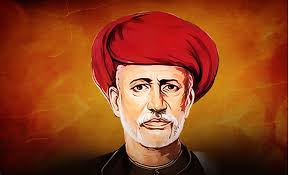UPSC Relevance
- GS-1: Indian Society & Modern History – Social Reformers, Caste Inequality, Education for Marginalized
- GS-2: Governance & Social Justice – Welfare for SCs/STs/OBCs, Educational Equity, Secularism
- GS-4: Ethics & Integrity – Social Reform, Humanism, Moral Leadership

Key Points: Life & Context
- Jyotiba Phule, born April 11, 1827, into the Mali caste, transformed a personal experience of caste-based humiliation into a lifelong fight against caste oppression.
- With his wife, Savitribai Phule, he established India’s first girls’ school in 1848 and numerous night schools for workers and marginalized groups.
Challenging Orthodox Structures
- Phule opposed Brahmanical patriarchy, untouchability, and caste hierarchies, advocating for equality for Shudras, Atishudras, and women.
- He founded the Satyashodhak Samaj (Truth-Seekers’ Society) in 1873 to promote inclusive spiritual and social dialogue, rejecting elitist groups like Arya Samaj and Brahmo Samaj.
Visionary Ideas
- Promoted education as a tool for empowerment, particularly for oppressed castes and women.
- Critiqued religious orthodoxy and superstition, authoring works like Satsarvajanik Satya Dharma Pustak to challenge scriptural justifications for inequality.
- Viewed religion as a human creation often used to perpetuate slavery and discrimination.
Economic & Agricultural Reforms
- Advocated for land redistribution, advanced farming technologies, and state-backed agricultural infrastructure to uplift rural marginalized communities.
- Proposed village schools and self-governance to address poverty and ignorance.
- Emphasized the state’s role in ensuring food, water, shelter, and economic dignity.
Legacy of Rational Humanism
- Rejected polygamy, caste discrimination, and animal sacrifice.
- Grounded in reason, compassion, equality, and scientific thinking.
- His inclusive reform model continues to shape discussions on social justice, secularism, and governance.
Analysis & Path Forward
- Phule’s vision underpins constitutional morality, Dalit empowerment, and progressive policies.
- Implementing his ideas on education, inter-caste harmony, and inclusive governance is vital for equity.
- His life inspires grassroots reform and courage in addressing caste inequalities.




